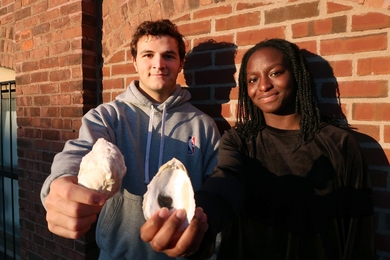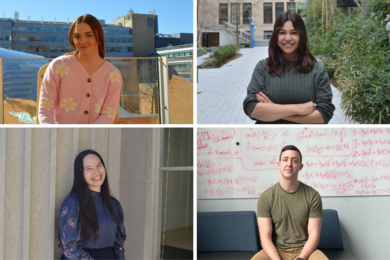To combat skepticism in some Congressional quarters about the value of funding scientific research at places like MIT, four undergraduates recently visited Washington, DC, to make the case personally.
The students--Aomawa Baker, a sophomore in earth, atmospheric and planetary sciences; Michelle Irizarry, a senior in chemistry; Gus Leotta, a senior in biology, and Marc Mander, a sophomore in electrical engineering--displayed posters of UROP work funded by the National Science Foundation at an exhibit held by the Coalition on National Science Funding at the Library of Congress. They also talked with legislators and other officials, including Neal Lane, head of the National Science Foundation. Much of their efforts were directed at rebutting the belief of Congressmen including Sherwood Boehlert (R-NY) that faculty members at places like MIT spend too much time on research and too little on classroom teaching.
"We tried to convey how important research is for us to the whole learning process," Ms. Baker said. Given the large lecture classes that students must take, especially early in their MIT careers, "sometimes the only chance to interact with faculty on a one-on-one basis is when you're doing a research project with them."
UROP offers students the chance to put into practice what they've learned in lectures and get feedback from professors, students told legislators and aides. "It's one thing to discuss [concepts], but when you see the applications, it enhances your understanding of the material," Mr. Mander said.
"I've gotten much more out of UROP knowledge-wise than from a lot of my classes," Mr. Leotta added.
Rep. Boehlert last year introduced language regarding the quality of teaching in an NSF reauthorization bill that was never adopted by Congress. That bill defines the policy of the NSF, although it does not appropriate funds.
The Congressman was receptive to the students and their message, said Toby Smith, legislative assistant in MIT's Washington office. Although it is unclear whether Rep. Boehlert's overall opinions changed, he told them that MIT was an exception to what he saw as an imbalance between faculty teaching and research.
"I think it was a very useful meeting," Mr. Smith said. "He seemed impressed by the number of students who go through the program." (About 80 percent of undergraduates do at least one UROP).
UROP was dealt a blow last year when the government stopped allowing universities to waive indirect costs for UROP research, meaning that those costs had to be paid out of faculty research grants. This meant that the cost of hiring a UROP student was effectively doubled. MIT allocated $1 million last April to make up the difference for 1994, but officers are hoping that another change in the rules will result in a more permanent solution. The Institute recently submitted a request to the Office of Management and Budget to restore the indirect-cost waiver on sponsored research, said Norma McGavern, UROP director.
Students also offered comments on the effects of eliminating the deferment of interest on Stafford loans while students are in school. Some Republican members of Congress are discussing this idea as a cost-saving measure, although no formal action has been taken. Sen. Edward Kennedy's aide Clayton Spencer was most interested in the students' statements about the added burden that such a change would create. "She said it was good to have specific cases to bring up," Ms. Irizarry noted.
Financial aid and UROP are linked, Ms. Baker noted, because students must raise a certain amount of money to supplement any financial aid they receive, and UROP jobs frequently provide such income.
A version of this article appeared in MIT Tech Talk on April 12, 1995.





